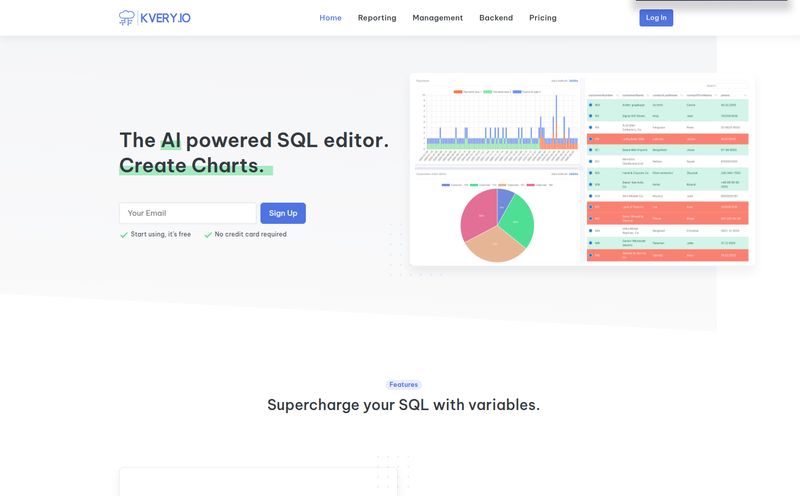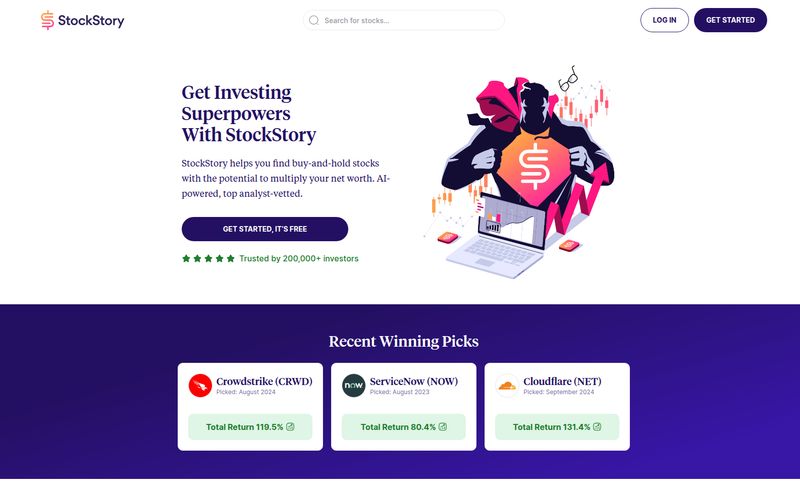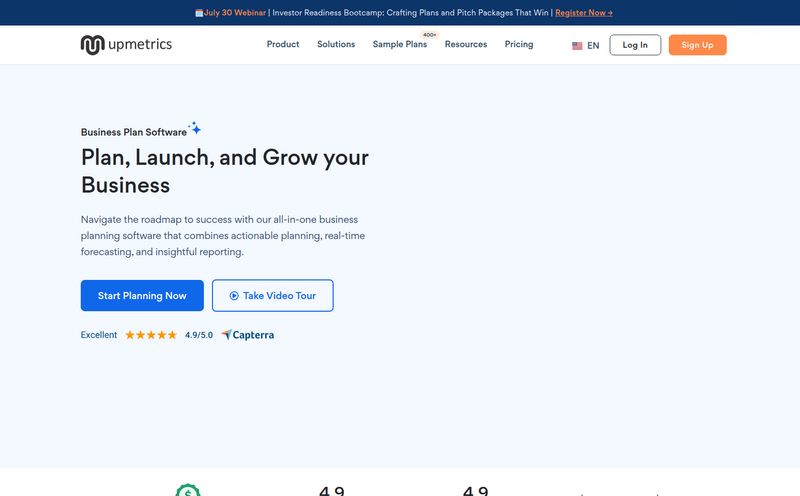The traditional drug discovery pipeline is, for lack of a better word, brutal. It’s a marathon of trial and error, costing billions of dollars and often taking more than a decade to get a single drug to market. For every celebrated success, there's a graveyard of failed candidates that never made it past preclinical trials. It’s the ultimate high-stakes gamble. As someone who’s watched the tech and data space for years, I’ve always been fascinated by the companies trying to fix this expensive, heartbreaking problem.
So, when I came across a tool called floatz AI for Drug Discovery, my curiosity was definitely piqued. I'll admit, getting the full scoop felt a bit like a digital scavenger hunt – their web presence is still growing, and I even hit a 404 page at one point. But what I managed to piece together paints a picture of a seriously ambitious platform.
The core promise is almost audacious: floatz claims it can deliver three clinically-relevant, high-potential drug targets in just 14 days. Yeah, you read that right. Two weeks. That’s a bold claim in an industry where timelines are usually measured in months and years.
What Exactly is Floatz AI? (And Why Should You Care?)
So what’s the secret sauce? Floatz AI isn't just another bioinformatics tool. It’s positioned as a specialized AI engine built for one purpose: to find the best possible starting points for new drugs. It does this by integrating a massive amount of data from different sources – we're talking human genetics, tissue expression patterns, biological pathways, and existing scientific literature.
Think of it like this. Imagine you're looking for a single, specific book in a library the size of a city. You could wander the aisles for years. Or, you could have an all-knowing librarian who has already read every book, understands how they all connect, and can hand you the three most relevant ones in minutes. That's the idea behind floatz AI. It sifts through billions of biological concepts to find targets with real “translational potential.” That’s the key phrase here. It’s not just about finding a target that looks good in a petri dish, but one that has a strong data-driven reason to believe it will actually work in humans. For any R&D team, that’s gold.

Visit floatz
The Floatz AI Promise: Speed, Data, and Confidence
When you boil it down, the value proposition of floatz rests on a few powerful pillars. This isn't just about being a neat piece of tech; it's about solving real-world R&D bottlenecks.
Cutting Down the Clock: 14 Days to a Target Brief
Let’s go back to that 14-day turnaround. They claim this is twice as fast as typical internal reviews. In the cutthroat world of pharma, speed is everything. Getting a two, three, or even six-month head start on a competitor can be the difference between market leadership and being second-best. This rapid delivery allows teams to iterate faster, test more hypotheses, and kill unpromising projects early, saving immense amounts of time and capital.
No More Guesswork, Just Pure Data
I’ve seen too many projects run on institutional knowledge or a lead scientist’s “gut feeling.” While experience is invaluable, it can also be biased. Floatz AI’s approach is to ground every suggestion in a mountain of empirical evidence. By layering data from human genetics, omics, disease biology, and even competitive intelligence, it builds a case for each target. This multi-layered analysis means the targets are high-confidence and, more importantly, defensible. You can walk into a boardroom and show exactly why this target was chosen, backed by data, not just a hunch.
Confidential and Partner-Ready Targets
Now this part is interesting. The output from floatz isn’t some interactive SaaS dashboard. It’s a confidential, client-specific PDF brief. My inner tech-bro initially scoffed at a PDF. A bit old-school, right? But then I thought about it from a biotech perspective. Intellectual property is everything. A secure, non-editable, easily-shareable document that outlines your next big targets is actually perfect. It’s a self-contained intelligence package. Plus, they guarantee that the targets delivered to you are exclusive. They won't be shopping the same ideas around to your competitors. That’s a huge deal.
A Look Under the Hood: How It Seems to Work
While floatz keeps its proprietary algorithms under wraps (as you’d expect), they do give us a glimpse into their methodology. It's not a black box where data goes in and magic comes out. It’s a structured process.
The system performs a multi-pronged analysis. It scans literature, crunches omics data, models disease biology, and even assesses the current competitive landscape to see who else is working on what. But here's the kicker that, for me, adds a layer of trust: the targets are expert-reviewed. This human-in-the-loop component is critical. It ensures that the AI's output makes biological sense and isn't just a statistical anomaly. It’s the perfect blend of machine-scale data processing and human-level wisdom, which is where AI truly shines.
The Fine Print: Guarantees and Pricing (Or Lack Thereof)
Anytime a service makes big promises, my first questions are about risk and cost. What happens if they're wrong? And what's this going to set me back?
What Happens if It Doesn't Deliver?
Floatz seems to understand this skepticism and has put some solid guarantees in place. First, there's a delivery guarantee: if you don’t get your brief in 14 days, you get a full refund. That’s confidence. Second, they have a satisfaction guarantee. If you're not happy with the targets, they'll apply your payment to a revised brief. This effectively de-risks the investment for R&D departments who are, understandably, careful with their budgets.
The Million-Dollar Question: What's the Cost?
And now for the part everyone wants to know. If you're looking for a pricing page with neat little tiers, you wont find one. There's no explicit pricing information available, which is typical for high-value, specialized B2B services like this. The cost is almost certainly dependent on the scope of the project—the disease area, specific constraints you might have (e.g., must be a certain type of protein), and the depth of analysis required. You’ll have to contact them for a quote. It's not a bug, it's a feature of bespoke, high-end consulting work, even when it's powered by AI.
Who is Floatz AI Really For?
This isn't a tool for casual experimentation. Floatz AI is clearly aimed at serious players in the life sciences space. I see a few ideal customers:
- Biotech Startups: Lean teams that need to de-risk their pipeline and show investors data-backed targets to secure their next round of funding.
- Large Pharma R&D Departments: Established companies looking to augment their internal discovery teams, fill their pipeline, or quickly validate new therapeutic areas.
- Academic Labs & TTOs: University researchers or technology transfer offices that have promising basic science and need to identify the most commercially viable targets to attract industry partners.
Essentially, if you're in a position where choosing the right target from the get-go can save you millions of dollars and years of work, this is a service built for you.
Final Thoughts
So, is floatz AI the future of drug discovery? Look, no single tool is a silver bullet. But from my perspective as a tech and data analyst, it represents a massive step in the right direction. It replaces slow, manual, and sometimes biased research with a fast, data-centric, and validated process.
It’s not about replacing brilliant scientists. It’s about giving them a more powerful weapon. By handling the heavy lifting of sifting through impossibly large datasets, tools like floatz AI can free up researchers to do what they do best: innovate and solve complex biological puzzles. The promise of identifying high-potential targets in just two weeks is more than just a marketing line; it’s a potential paradigm shift in how we approach the very first, and most critical, step in creating new medicines. And that’s something to be genuinely excited about.
Frequently Asked Questions
- How much does floatz AI cost?
- There is no public pricing. It's an enterprise-level service, so you'll need to contact their sales team for a quote based on your specific project needs.
- What is the final deliverable from floatz AI?
- You receive a confidential and exclusive PDF brief detailing three clinically-relevant drug targets, including the data and analysis backing their selection.
- How is floatz AI different from other bioinformatics platforms?
- Its key differentiators are speed (14-day delivery), a focus on translational success by integrating multiple data types (genetics, omics, etc.), and a final expert review to ensure the biological validity of the AI-selected targets.
- Is there a guarantee on their service?
- Yes. They offer a 14-day delivery guarantee (or a full refund) and a satisfaction guarantee where they will create a revised brief if the initial one doesn't meet your needs.
- Can I provide specific requirements for the target search?
- Yes, the platform is designed to incorporate client-specific constraints, such as focusing on a particular modality (e.g., small molecules, antibodies) or other biological criteria.
Reference and Sources
- floatz AI Official Website (Note: Website may be under development)
- How AI is accelerating drug discovery - Nature



